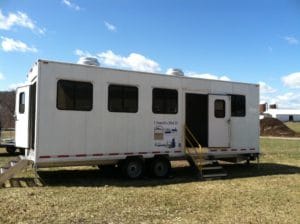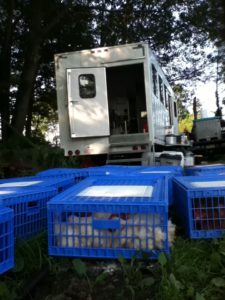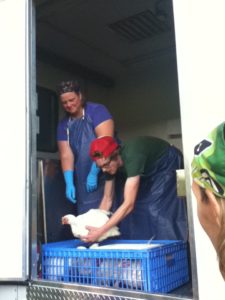The Challenges and Rewards of On-farm Poultry Processing
When’s the last time you saw “locally grown” stamped on a chicken at the grocery store? How many restaurants do you know that tell you who raised the duck on their menu? The market is out there—pasture-raised broilers can fetch over $30 per bird—but the supply isn’t keeping up. So what’s the holdup?
If you’ve ever tried to raise and sell poultry for meat, you already know the culprit: processing. USDA allows farmers raising fewer than 20,000 chickens or 5,000 turkeys per year to process their own birds on-farm. It’s up to states to decide how much to regulate beyond that. Some states, like New Hampshire and New York, are relatively lax; others, like Massachusetts and Connecticut, ask more of producers before allowing them to process and sell poultry on their own farm.
Until recently, most small poultry farmers in Massachusetts have chosen between two options: pay up to build and license their own on-farm slaughter facility, or operate under the radar. It was only two years ago that a reasonably close USDA facility came online, but even that one is in Vermont. The other option is to rent a mobile poultry processing unit, or MPPU, essentially a “chicken slaughterhouse on wheels” that travels to individual farms (with the blessing of the state Department of Public Health), allowing farmers an avenue to legally process and sell their own birds.

Massachusetts’ newest Mobile Poultry Processing Unit saw its first year of operation in 2011. Photo by Sam Anderson
Several MPPUs are in various stages of operation around the Northeast. In Massachusetts there are two state-approved “mainland” units managed by New Entry Sustainable Farming Project and New England Small Farm Institute, and another operated by Island Grown Institute on Martha’s Vineyard.
While on-farm processing is available to producers who may not have any other (legal) way to bring poultry to market, many producers have shown a hesitation to get involved with it. There are three main challenges that scare farmers away from legal on-farm processing—and possibly, in turn, from starting a poultry business at all.
The financial commitment. If you are building your own facility to meet regulatory standards, depending on what you already have in place, you could find yourself running up a bit of a bill. Anytime you spend $20,000 (and it could be less or quite a bit more, depending on your setup), it’s obviously a commitment, and that could be a problem if you aren’t ready to say with certainty that you will be running a poultry business for at least the next few years. However, if you are able to make that commitment, building your own facility may save you a bundle in the long term compared to hauling each batch to a processing plant. It also enables you to process smaller batches throughout the season rather than concentrating your birds into three to five larger batches, saving you both transportation costs and freezer space.

The Mobile Poultry Processing Unit set up for processing day in Dracut, Massachusetts. Courtesy of Jennifer Hashley.
Part of the idea of renting an MPPU is to avoid the financial commitment of building your own facility. Producers sometimes balk at the rental fee and, in Massachusetts, the $225 annual cost of a state slaughter license. The new MPPU’s rental fee in 2011 was $175 per use for 100 or fewer birds, adding $25 for each additional 50 birds ($200 for 150 birds, $225 for 200 birds, etc.). This means that in order to process three batches of 150 birds, we paid a total of $825 in rental and license fees. This sounds like a lot at first, but it only comes out to $1.83 per bird; even adding the costs of ice, utilities, assorted supplies, and transporting the MPPU, we still came in well under the $5 per bird (plus transportation) we would have paid at the nearest USDA facility.
The regulatory hassle. In states like New York and New Hampshire, this may not be a big issue; in Massachusetts, it often is. In order to have licensed on-farm poultry processing, even with state-approved MPPU, the producer must apply for a state slaughter license with the Department of Public Health and get approval from the local Board of Health. We had to do it ourselves this year, and yes, it’s a bit of a hassle. However, the upshot is that once you get over that initial hurdle, it gets much easier. If your alternative is to go out behind the barn and process on the down-low, you can’t sell those birds at a farmer’s market or farm stand, and you run the risk of getting in trouble—a hard risk to quantify in a farm business plan. Producers who are already doing this sort of processing may be worried that they’ll get in trouble if they go to the regulators to ask about how they can become licensed, but we have found that the regulators are much less interested in busting well-meaning farmers than in helping them.
The logistical hassle. There’s no way around it: processing poultry is a pain. That’s a point which cannot easily be massaged. Michael Pollan did a nice job of idealizing the do-it-yourself approach in Omnivore’s Dilemma, but the truth is that slaughtering, plucking and eviscerating a chicken is an inherently messy job. However, farmers are as equipped as anyone to deal with that aspect, and with the right people, processing day can actually become a sort of unorthodox, character-building social event. Pete & Jen’s Backyard Birds in Concord, Mass. (“Jen” happens to be New Entry’s director, Jennifer Hashley) draw crowds of 20 or more volunteer helpers each processing day, from all walks of life. At our own processing days, we attracted 8 to 12 volunteer workers by making it an educational event.
The bigger issue is the stress involved in ironing out the details before processing day: ordering supplies, coordinating workers and customers, transporting and setting up the unit (if using an MPPU), and dealing with all the little things that seem to come up right before processing day. It’s easy to get anxious about something going wrong on processing day, but it seems that your best bet is to make a list, check it twice, and then accept the infallible golden rule of processing day: that whatever you do to prepare, something will not go according to plan. All you can do is be ready to deal with it.

On-farm processing lets the producer ensure that birds are handled with care. Courtesy of Jennifer Hashley.
I may not be painting a very rosy picture, but believe it or not, there are also upshots to the experience of processing your own birds. For some, the biggest advantage is the complete transparency of it. As the producer and the processor, you control every step of the way, and you can see to it that the job is done to your standards. That transparency can be an important selling point for your customers, too, and can even bring you a bit of attention: the last two seasons, the four main producers using the MPPU have all been featured in a news story, from the local paper to NPR.
It may sound sentimental, but one of the most valuable aspects of processing your own birds is the satisfaction and sense of accomplishment you should feel afterwards. Sure, on-farm processing might lower your costs and help you market your birds, and it has to make sense for you financially; but don’t be surprised if you feel especially proud of the end product as you hand it off to your customers.
For more information about the Massachusetts MPPUs or small-scale poultry processing in general, please visit the website, email sanderson@comteam.org, or call 978-654-6745.


I really appreciate ur piece of work. please I need the detail. of equipments required for setting up on farm processing unit.
The insights on the challenges and rewards of on farm poultry processing are invaluable. It is inspiring to see the dedication and innovation of farmers in overcoming obstacles to bring locally raised poultry to market.
Viking & Thermador Appliance Repair Services in Irvine
This article sheds light on the intricate process and considerations involved in on farm poultry processing. It is encouraging to witness the commitment of farmers towards transparency and quality in their products.
Viking And Thermador Appliance Repair in Irvine